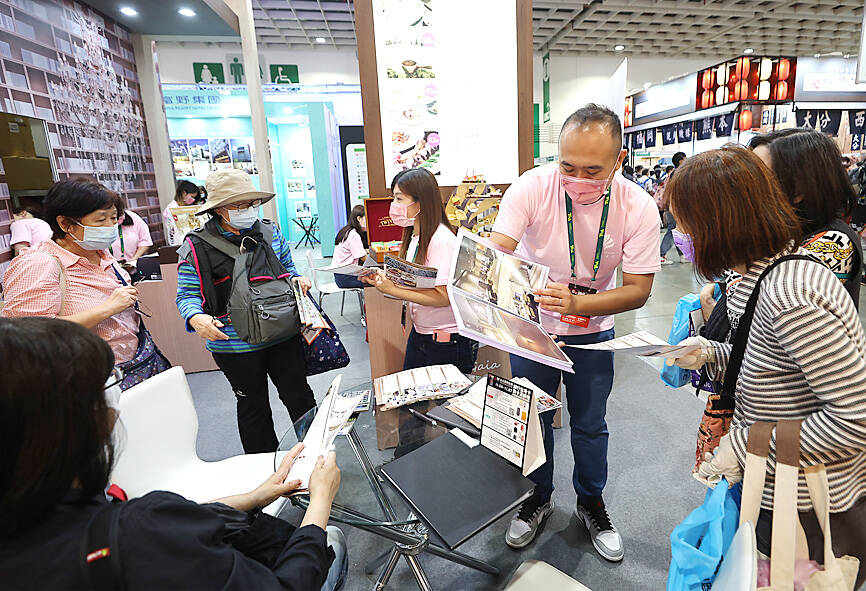The number of workers on furlough programs in Taiwan dropped by 983 over the past week as more businesses brought back staff from unpaid leave, the Ministry of Labor said yesterday.
The number of workers on furlough programs dropped from 18,163 on Thursday last week to 17,180 yesterday, while the number of companies implementing unpaid leave programs fell by 173 to 2,525, ministry data showed.
Department of Labor Standards and Equal Employment Director Huang Wei-chen (黃維琛) said that some companies in sectors driven by local demand have begun bringing back staff from unpaid leave.

Photo: CNA
Citing the support services industry as an example, Huang said that a large travel agency had its last 52 furloughed employees return to work, while the number of furloughed people in the accommodation and catering sector also fell.
In the transportation industry, two airlines that mainly provide flight services to Southeast Asia ended furlough programs following a rebound in passenger volumes, he said.
Although the number of airline ground staff on unpaid leave did not decrease over the past week, Huang said he expects the situation to improve early next year.
Fewer companies in the manufacturing sector implemented unpaid leave programs over the past week, although the number of workers on furlough increased slightly, the ministry said.
The increase was particularly evident in the machine tool industry, Huang said, without elaborating.
According to the latest figures, the number of furloughed workers in the manufacturing industry was 5,422, while the number of companies with unpaid leave programs was 273.
The figures represent a slight deterioration from Thursday last week, when 5,386 people in the manufacturing sector were on unpaid leave and the number of companies implementing such programs was 276.
The weekly furlough data came after government data last week showed that Taiwan’s factory activity shrank for a fifth straight month last month due to inventory corrections and sluggish demand.
The manufacturing purchasing managers’ index last month shed 1.5 points to 43.9, well below the 50-point mark separating growth from contraction and the lowest since the launch of the survey in July 2012, the Chung-Hua Institution for Economic Research (CIER, 中華經濟研究院) said.
The weak manufacturing activity gauge could persist until the impact of global monetary tightening fades, likely by the end of next year, CIER economists said.
Additional reporting by Crystal Hsu

UNCERTAINTY: Innolux activated a stringent supply chain management mechanism, as it did during the COVID-19 pandemic, to ensure optimal inventory levels for customers Flat-panel display makers AUO Corp (友達) and Innolux Corp (群創) yesterday said that about 12 to 20 percent of their display business is at risk of potential US tariffs and that they would relocate production or shipment destinations to mitigate the levies’ effects. US tariffs would have a direct impact of US$200 million on AUO’s revenue, company chairman Paul Peng (彭雙浪) told reporters on the sidelines of the Touch Taiwan trade show in Taipei yesterday. That would make up about 12 percent of the company’s overall revenue. To cope with the tariff uncertainty, AUO plans to allocate its production to manufacturing facilities in

Taiwan will prioritize the development of silicon photonics by taking advantage of its strength in the semiconductor industry to build another shield to protect the local economy, National Development Council (NDC) Minister Paul Liu (劉鏡清) said yesterday. Speaking at a meeting of the legislature’s Economics Committee, Liu said Taiwan already has the artificial intelligence (AI) industry as a shield, after the semiconductor industry, to safeguard the country, and is looking at new unique fields to build more economic shields. While Taiwan will further strengthen its existing shields, over the longer term, the country is determined to focus on such potential segments as

TAKING STOCK: A Taiwanese cookware firm in Vietnam urged customers to assess inventory or place orders early so shipments can reach the US while tariffs are paused Taiwanese businesses in Vietnam are exploring alternatives after the White House imposed a 46 percent import duty on Vietnamese goods, following US President Donald Trump’s announcement of “reciprocal” tariffs on the US’ trading partners. Lo Shih-liang (羅世良), chairman of Brico Industry Co (裕茂工業), a Taiwanese company that manufactures cast iron cookware and stove components in Vietnam, said that more than 40 percent of his business was tied to the US market, describing the constant US policy shifts as an emotional roller coaster. “I work during the day and stay up all night watching the news. I’ve been following US news until 3am

COLLABORATION: Given Taiwan’s key position in global supply chains, the US firm is discussing strategies with local partners and clients to deal with global uncertainties Advanced Micro Devices Inc (AMD) yesterday said it is meeting with local ecosystem partners, including Taiwan Semiconductor Manufacturing Co (TSMC, 台積電), to discuss strategies, including long-term manufacturing, to navigate uncertainties such as US tariffs, as Taiwan occupies an important position in global supply chains. AMD chief executive officer Lisa Su (蘇姿丰) told reporters that Taiwan is an important part of the chip designer’s ecosystem and she is discussing with partners and customers in Taiwan to forge strong collaborations on different areas during this critical period. AMD has just become the first artificial-intelligence (AI) server chip customer of TSMC to utilize its advanced